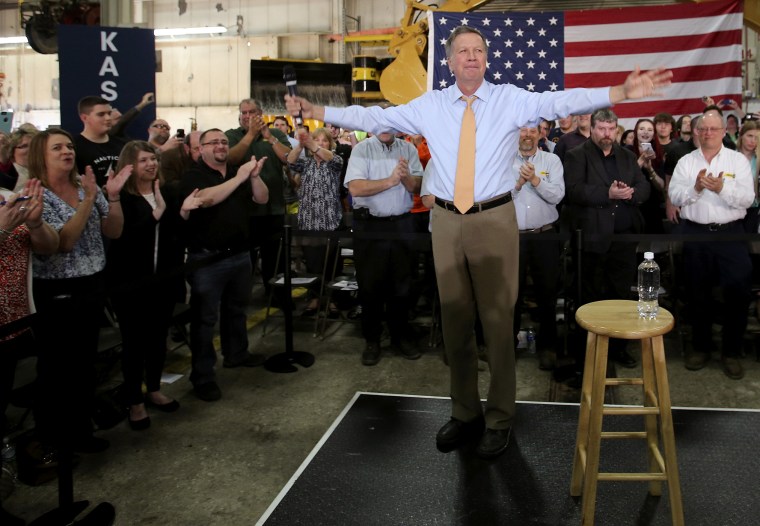For Republicans hoping for a shake-up in their party's presidential race, there's an obvious worst-case scenario: Donald Trump sweeps tomorrow's contests and effectively ends the primary process. There's also, of course, a best-case scenario: John Kasich wins his home state of Ohio; Marco Rubio wins his home state of Florida; Ted Cruz comes out on top in Missouri or Illinois (or both); and all of a sudden, it's a whole new GOP race.
At least one Republican candidate believes it's not enough to simply hope for the best-case scenario; it's time to actually take steps to make such an outcome more likely. MSNBC
reported late last week:
Facing a nearly insurmountable delegate deficit and the threat of Donald Trump possibly running away with the Republican presidential nomination if the billionaire wins the Florida and Ohio primaries next week, Sen. Marco Rubio's campaign acknowledged Friday that Ohio voters who oppose Trump should vote for Gov. John Kasich. At a news conference with Jewish leaders, Rubio stopped short of asking his Ohio supporters to vote for the governor.... But a senior adviser told NBC News that Rubio's campaign is essentially "releasing" his Ohio voters to Kasich.
In a CNN interview, the Rubio campaign's communications director, Alex Conant, abandoned all subtlety in his call for strategic voting. "If you are a Republican primary voter in Ohio and you want to defeat Donald Trump, your best chance in Ohio is John Kasich," Conant
said.
In other words, according to the Rubio campaign, Ohio Republicans who are inclined to vote for Rubio tomorrow should, at the candidate's urging, cast a ballot for someone else. It's not that Rubio is endorsing Kasich, so much as the senator supports a broader strategy: if Rubio backers help propel Kasich to victory in Ohio, it'll hurt Trump and indirectly help Rubio, too.
If such a gambit sounds familiar, it's because Mitt Romney
recently recommended GOP voters adopt this exact scenario.
There is, however, a fairly significant flaw in the plan: Team Kasich seems to think this is a terrible idea.
In a
rather abrasive response to Team Rubio's suggestion, the Ohio governor's spokesperson said Kasich expects to win Ohio without Rubio's help, "just as he's going to lose in Florida without ours."
Ouch.
Why wouldn't Team Kasich warm up to a loose, temporary partnership like this? Keep in mind that the Ohio governor really is well positioned to prevail in his home state. In the five big contests on tap for tomorrow, polls show Trump ahead in four of the five -- and Ohio is the exception.
In a close race, Rubio backers might be able to give Kasich an even stronger chance of success, but the governor believes he can win without making any deals, and there's ample evidence that suggests he's correct.
The same is not true of Rubio, who's in a weaker position in his home state. If Kasich urged his Florida-based backers to support the senator, it might give Rubio the boost he needs to overcome his current deficit, but the truth of the matter is, Rubio is in a more desperate position than Kasich is -- and Kasich wouldn't mind at all if Rubio loses Florida and quits soon after. Indeed, if the governor wins Ohio and Rubio loses Florida, it would likely force the senator out of the race and put Kasich in a much stronger position going forward.
The South, a region where [Kasich's] been particularly weak, is practically done voting. And many big Northeastern, Midwestern, and West Coast states -- states where a mainstream alternative to Trump and Cruz could catch on -- haven't yet voted. So Kasich is still hoping he could be that mainstream alternative, pick up lots of delegates, and become a serious player at a contested convention. To make that happen, he wants Rubio -- his only remaining mainstream-friendly rival -- out of the race. If Rubio wins Florida, though, he has a pretext to stay in the race. So Kasich has no desire to help him do that.
What officials on Team Rubio effectively suggested last week was that Team Kasich throw them a life-preserver before they drown. The governor's campaign responded with an anvil.
The decision carries its own set of risks. If Kasich loses Ohio by a point or two, he and his aides, shortly before writing their withdrawal speech, will likely tell one another, "We probably should've made that deal with Marco."
But if they hold on in Ohio and Rubio loses Florida, they'll look at Friday's decision as the smartest move Team Kasich made all year.
